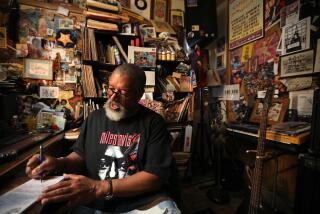Putting a Pen to Life in the Backwoods
- Share via
SIDE LAKE, Minn. — Free-lancers, Peter Leschak calls them.
Meaning friends and neighbors who maintain their backwoods life style in the face of tough economics by, well, remaining flexible.
“A lot of people are free-lancing up here,” Leschak said while sipping freshly ground coffee in his log home. “They plant trees or fight fires in the spring. They do a little construction. Whatever it takes. But they don’t need much to get by.
“Most people heat with wood. So you just have to figure on putting 40 to 80 hours a year of backbreaking work in. And if your truck breaks down, you don’t just run it in to the Ford garage. You’re going to get down on your belly and try to fix it.”
Getting Along
The flip side is the payoff, he said.
“We do things as a matter of course that people pay big bucks to do,” he said, spreading his hands. “There are half a dozen saunas around here we can use. What’s better on a summer night than taking a sauna and hitting the lake?”
Leschak himself did a bit of free-lancing this spring, including fighting fires for the Department of Natural Resources. But his true calling in the world of free-lancing is writing about his experiences. He has developed a regional, and now national, audience.
The 36-year-old Chisholm native is the author of “Letters From Side Lake: A Chronicle of Life in The North Woods,” released in May by Harper and Row. Parts of the book originally appeared as essays in regional and national publications, among them Minnesota Monthly magazine, Twin Cities magazine and TWA Ambassador magazine.
In the 196-page book, Leschak paints a lively portrait of rural northern Minnesota life.
Leschak and his wife, Pam, who’s also a writer, built their log home on 40 acres of land near the tiny village of Side Lake. It’s a comfortable space, both rustic and refined. Snowshoes, dried herbs and quilts hang from the walls above highly polished hardwood floors.
Rough and Smooth
Leschak’s essays touch upon both the rough and the smooth textures of life on the Iron Range. He writes of heading the volunteer fire department on sub-zero night runs, and of the high seriousness his loose-knit community applies to properly flooding a skating rink. He’s familiar with folly, from enduring a frightening swim to save a baby bird in a lake, to having his belly tattooed by the scorching exhaust pipe of a chainsaw.
He has skinned bear and moose, less than expertly, and puts the reader elbows deep in the bloodbath. And he can be something of a wild man. There’s the pagan winter solstice festival he hosted dressed in a bear skin and gray sweatshirt. The time he and a friend hiked the tortuous Kekekabic Trail in 1 1/2 days, one-third the time usually recommended.
And the story of the world’s hottest sauna, a 300-degree ordeal that scorched his and his pals’ hair, nearly burned down the structure and ended with a plunge into 55-degree lake water.
Not exactly genteel Thoreau-like stuff. Leschak is neither boastful nor apologetic.
“That’s what I like to write about sometimes. I mean, rhapsodizing all the time about the beauties of the woods--well it’s beautiful, that’s the way I feel about it, but I go out there for the hardship, too, sometimes.”
Although he painstakingly writes first drafts longhand in a spiral-bound notebook, he’s prolific by any standard. Last year he wrote 40 manuscripts for publication. He tries to have 25 submissions circulating at any given time, he said, “so there’s always hope when I go out to the mailbox.”
Second Group of Essays
He has much to be hopeful about. He finished a second collection of essays last December. It’s about coming of age in the ‘60s, “a rites-of-passage sort of thing” that is being considered for publication. And he expects to finish a second book about life in Side Lake soon.
Leschak began writing seriously in 1980 and has made his living solely by writing since December, 1984.
“I wanted to live in the woods, and it was really that simple,” Leschak said. “It sounded great--you know, sit in a log cabin and write books. And it is great. It works.”
More to Read
Sign up for The Wild
We’ll help you find the best places to hike, bike and run, as well as the perfect silent spots for meditation and yoga.
You may occasionally receive promotional content from the Los Angeles Times.






